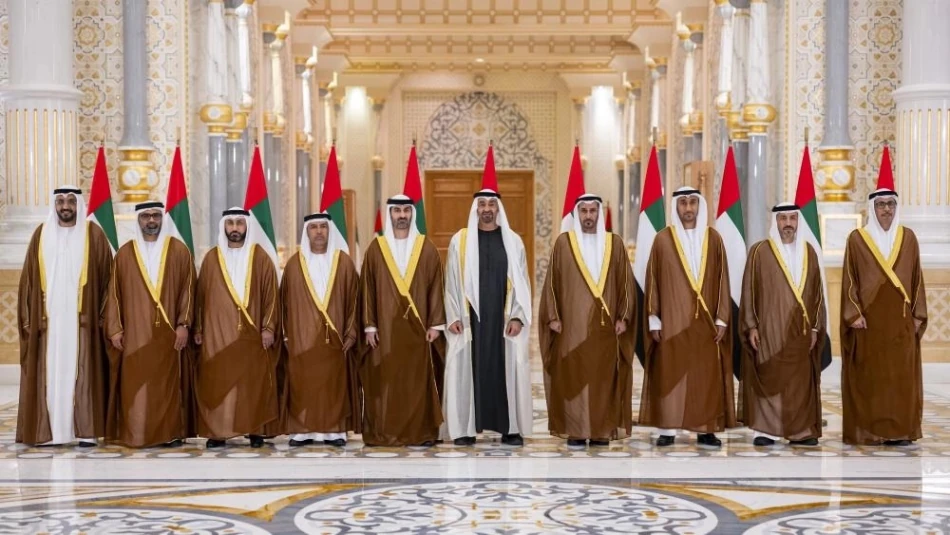
Emirati Ambassadors Take Oath Before President, Receive Credentials
UAE Strengthens Diplomatic Reach with New Ambassador Appointments Across Strategic Regions
The United Arab Emirates has appointed nine new ambassadors to key nations spanning the Middle East, Asia, and Europe, signaling Abu Dhabi's continued commitment to expanding its diplomatic influence amid shifting regional dynamics. President Sheikh Mohammed bin Zayed Al Nahyan oversaw the swearing-in ceremony at Qasr Al Watan, while also receiving credentials from six incoming foreign ambassadors, highlighting the UAE's growing role as a regional diplomatic hub.
Strategic Appointments Reflect Regional Priorities
The new UAE ambassadorial appointments reveal clear strategic priorities. The naming of ambassadors to Saudi Arabia, Syria, Lebanon, Libya, and Iran underscores the Emirates' active engagement in Middle Eastern affairs at a time of significant regional realignments.
Particularly noteworthy is the appointment of an ambassador to Syria, reflecting the UAE's earlier decision to restore diplomatic ties with Damascus in 2018 – a move that positioned Abu Dhabi ahead of other Arab nations in re-engaging with the Assad government. The Emirates has consistently advocated for Syria's reintegration into the Arab League, which materialized in 2023.
Iran Relations Signal Pragmatic Diplomacy
The appointment of Khalid Abdullah Hamid Abdullah Balhoul as ambassador to Iran demonstrates the UAE's pragmatic approach to regional relations. Despite historical tensions over territorial disputes and proxy conflicts, the Emirates has maintained diplomatic channels with Tehran while strengthening security partnerships with Western allies.
This balanced approach has allowed the UAE to position itself as a potential mediator in regional conflicts while protecting its economic interests. Trade between the two nations exceeded $15 billion in recent years, making pragmatic diplomatic engagement essential for both countries.
Expanding Beyond Traditional Spheres
The appointments extend beyond the Middle East, with new ambassadors designated for Pakistan, Montenegro, Guinea-Bissau, and Afghanistan. The Afghanistan posting is particularly significant, as the UAE has maintained one of the few active diplomatic presences in Kabul since the Taliban's return to power in 2021.
This continued engagement with Afghanistan reflects the Emirates' broader strategy of maintaining diplomatic channels even with controversial governments, prioritizing stability and humanitarian concerns over ideological alignment.
Incoming Diplomatic Credentials Signal Growing Influence
The simultaneous reception of credentials from ambassadors representing Egypt, Jordan, Lebanon, Myanmar, Serbia, and Ukraine demonstrates the UAE's growing attractiveness as a diplomatic partner. The presence of a Ukrainian ambassador is particularly notable given the Emirates' careful balancing act between Western allies and Russia throughout the ongoing conflict.
Egypt and Jordan's continued high-level diplomatic engagement reflects the UAE's central role in Arab politics and its influence in regional economic development. Both nations have benefited significantly from Emirati investment and development aid in recent years.
Implications for Regional Diplomacy
These appointments come at a crucial time for Middle Eastern diplomacy. With Saudi-Iranian rapprochement, the Abraham Accords creating new regional dynamics, and ongoing conflicts in Yemen and Gaza, the UAE's diplomatic network positions it as a key player in future regional arrangements.
The Emirates' approach of maintaining dialogue with all regional actors – from Iran to Israel, from Syria to Saudi Arabia – has created unique diplomatic capital that few other nations possess. This latest round of appointments suggests Abu Dhabi intends to leverage this position more actively in the coming years.
For international businesses and investors, the UAE's expanding diplomatic reach reinforces its position as the region's most stable hub for commerce and finance, with growing influence that extends well beyond its traditional Gulf sphere.
Most Viewed News

 Sara Khaled
Sara Khaled






